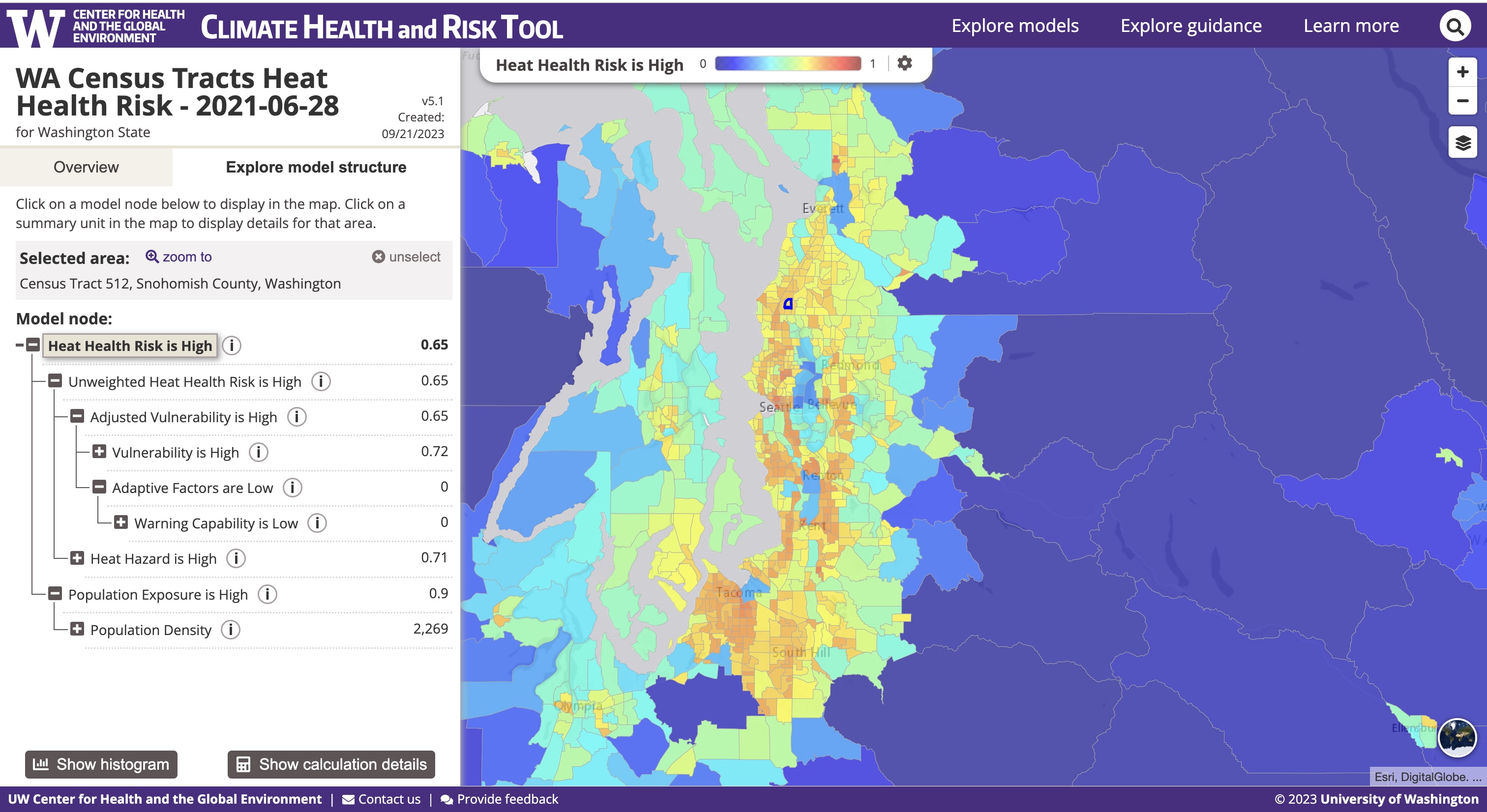The impacts of climate change on human health are severe: Extreme heat events put stress on the body, increasing the risk of heat stroke, hospitalization for heart disease, kidney failure and poor mental health. In the U.S., deaths due to extreme heat increased 117% from 1999 to 2023. Climate-related disasters like wildfires, drought and flooding can lead to illness or injury, while increased temperatures can spread infectious diseases.
That’s why researchers at the University of Washington School of Public Health are working with the communities most impacted by climate change to prepare for extreme heat events or climate-related disasters. This work is called climate change adaptation, and is critical to saving lives and building resilient communities.
Partnerships between faculty, local governments and communities are innovating data-informed heat mapping tools, supporting communities to receive funding for climate-change related health impacts, and training the next generation of leaders to prepare for climate-related disasters. Collectively, their work will protect the health of people in Washington and globally.
“While we are making great progress in climate change mitigation, we still have unmanaged risk for population health driven by climate change and we are not investing adequately in preparing for that,” said Dr. Jeremy Hess, professor in the UW departments of Environmental & Occupational Health Sciences (DEOHS), Global Health, and Emergency Medicine. Hess also directs the Center for Health and the Global Environment (CHanGE) in the UW School of Public Health, which leads important work on supporting communities for the health impacts of climate change.
“We are looking forward to having a meaningful impact in that space regionally and globally,” Hess said. “We are also eager to work collaboratively across the university and with partners locally and regionally, in practice, research, global health and philanthropy. There’s a lot of opportunity here.”

A tool to innovate heat-health-risk mapping
When extreme heat events occur in Washington state, everyone can feel the impacts, but some feel them more acutely than others.
That’s why Hess and fellow researchers at CHanGE have been mapping out how extreme heat impacts communities differently in Washington. They created the Climate Health and Risk Tool (CHaRT), a heat-health risk mapping and decision support tool.
These maps show how temperatures vary across counties during extreme heat events and the vulnerability of people to heat impacts in these counties. CHaRT helps businesses, health departments, policymakers and other organizations assess community risk to climate-related environmental events based on three factors: vulnerability, hazard and exposure, and then points them to interventions to consider.
Community-driven solutions for extreme heat
Recently, Public Health – Seattle & King County and Puget Sound Energy have been using the tool to help support the communities they serve. These local partnerships will help CHanGE improve CHaRT so that it can expand its reach and impact from Washington state to across the country.
Public Health – Seattle & King County (PHSKC) has been using CHaRT in a pilot project to help formulate community-driven solutions to climate change health impacts in Auburn, Washington. As an urban heat island, Auburn was one of the most negatively impacted communities in western Washington by the 2021 heat dome in the Pacific Northwest.

In partnership with Gates Ventures and Dr. Saria Hassan from Emory University, the pilot project is called the Climate and Health Adaptation Mapping Project for Community Determined Solutions (CHAMP-CDS). PHSKC has gathered a 15-community-member workgroup from Auburn to learn about their experiences with extreme heat in the city, share information with them on heat health impacts, and collectively create a model for solutions to extreme heat that can be shared with decision makers.
“Climate change is making heat events last longer, be more frequent, and be more intense,” said Cat Hartwell, project manager for CHAMP-CDS at PHSKC. “Heat doesn't affect populations equally and it is locally specific, so a project like this is important because you get these hyperlocal community-determined solutions that people who are experiencing the heat are identifying themselves.”
CHaRTing a future
CHaRT will be the foundation of a national research trial as part of a grant Hess and his UW SPH collaborators received from the National Institute of Environmental Health Sciences. The P20 grant will form a new exploratory research center called the UW Research and Engagement on Adaptation for Climate and Health (REACH) Center. CHaRT will play a critical role as the REACH Center works to implement evidence-based health adaptation at scale.
CHanGE was also recently awarded a grant from the Wellcome Trust to understand how socioeconomic factors will influence climate change’s health impacts over the next century. Led by Hess and DEOHS and Global Health Professor Kristie Ebi, the project will update the Shared Socioeconomic Pathways, or scenarios defined by the United Nations to project ways global society might evolve in areas like population growth, income inequality and technological advances. Accurate projections will help countries prepare for future health burdens caused by climate change, so that they can protect population health for decades to come.
Adapted from the original post here, a story that appeared in the Fall 2024 issue of SPH Magazine.




